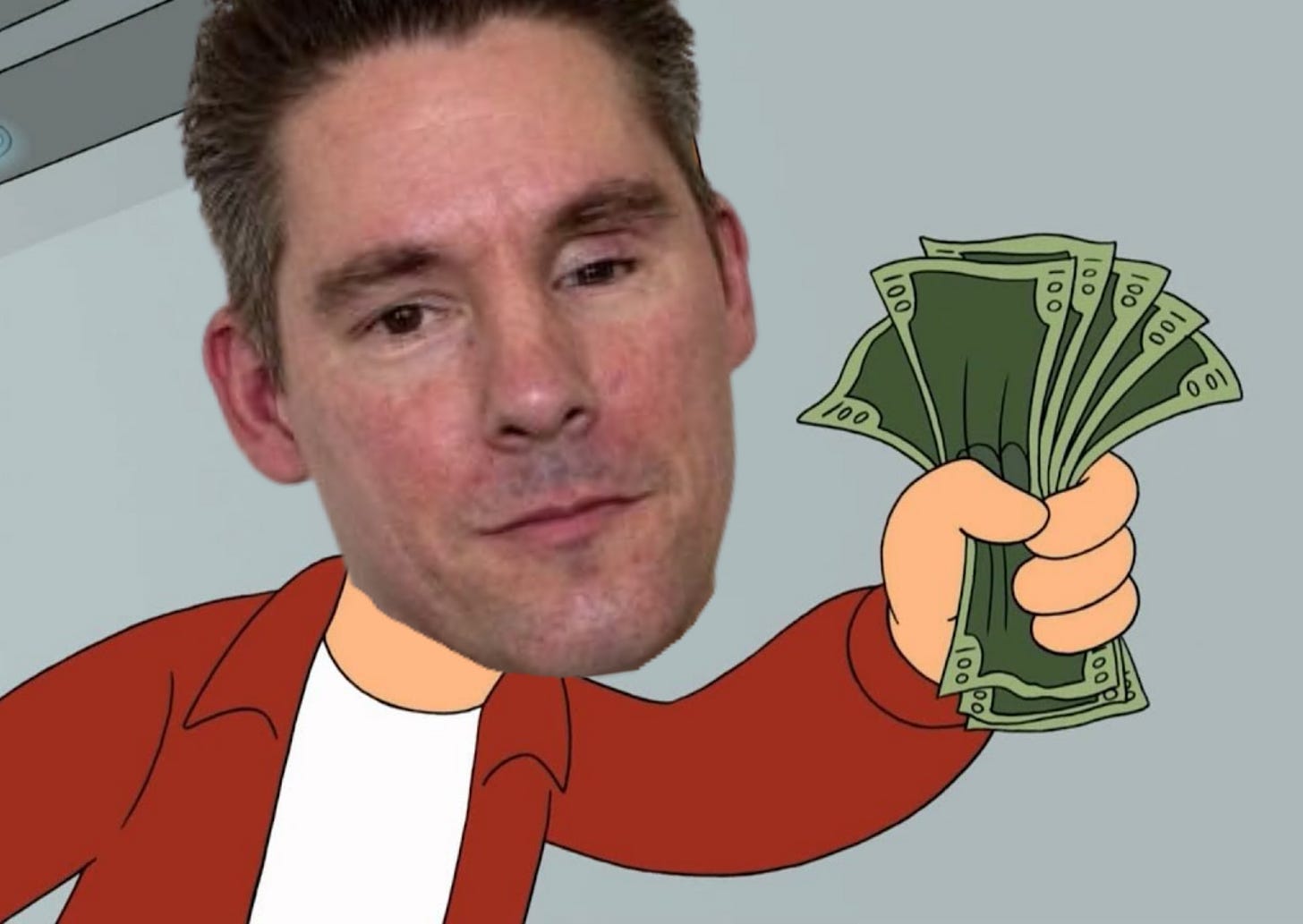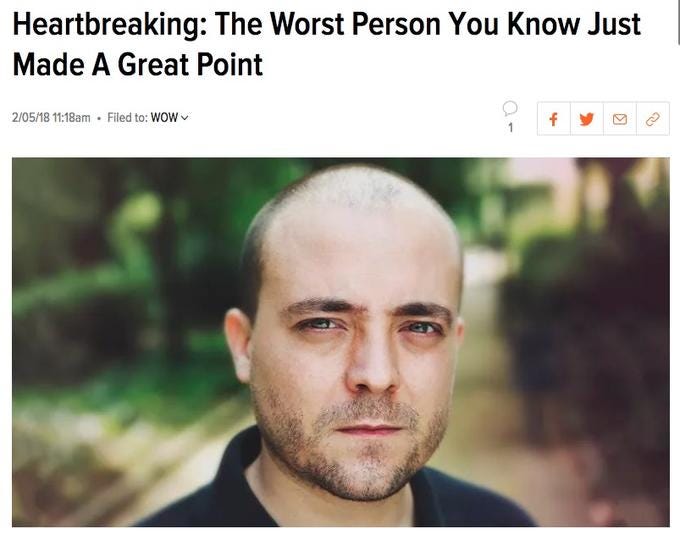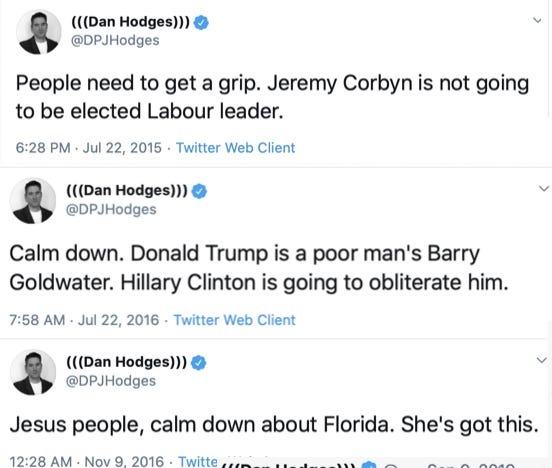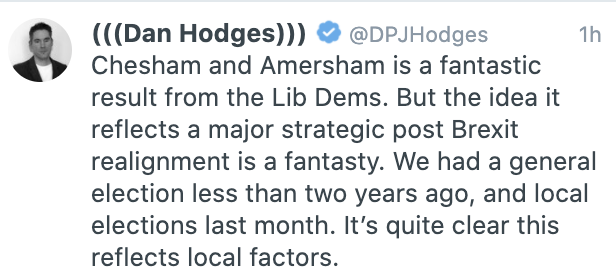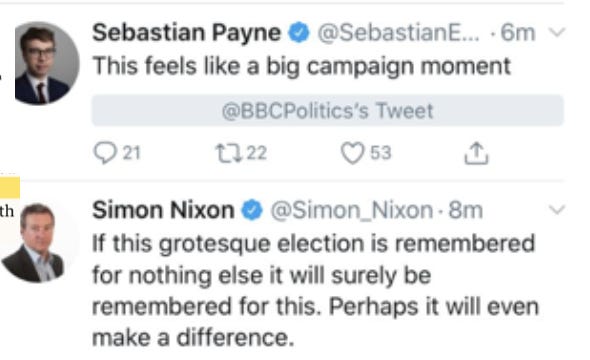Political hacks as pay pigs: Cummings is right about columnists; they're just delighted he's talking about them...
British commentators are a joke and think laughing at themselves makes that okay.
Matt Chorley’s column has an all-purpose opening today, which could be applied to everything he writes and most of the British commentariat’s output:
There’s no point in your reading this. I can barely be bothered to type it.
Chuckling Chorley, possessor of the most self-satisfied byline picture in British journalism is largely confined to the Murdoch-sponsored play pit that is Times Radio now, but his Marina Hyde as made by Wish.com ramblings — comprised of lines that have the structure of jokes but none of the content — appear every Saturday in The Times.
After stints as Political Correspondent at The Independent on Sunday, Political Editor at MailOnline, and Editor of The Times’ Red Box blog and email newsletter, Chorley remains one of the many boys in the Westminster bubble, his brain permanently affected by the lack of oxygen. His Times Radio show promises “politics without the boring bits” and delivers politics at its most glib.
I thought about that “politics without the boring bits” slogan when I saw Dominic Cummings had turned his sneering Sauron’s eye towards the Westminster press pack once again. Inevitably expressed in the form of Twitter thread, Cummings’ criticisms began…
1/ Pundit babble pollutes understanding and MP/official incentives. Want to improve your understanding of politics? Stop reading these pundit babblers. They don't understand political communication, never mind how power actually works in SW1. Typical e.g - overconfident + wrong
… and included a screenshot of a tweet from the Financial Times’ Chief Political Correspondent, Jim Pickard, offering a ludicrously confident prediction ahead of the Chesham & Amersham by-election:
Seeing lots of excited speculation today but I’ll eat my hat if the Lib Dems win here — one of the most true blue seats in the country.
Some partial credit to Pickard who, having failed to learn the lesson of Matthew Goodwin who had to partially eat a copy of his own book after predicting Labour under Corbyn would poll less than 38% in the 2017 election, did actually eat at least some of his hat on camera:
But while Pickard stuck to his word and was part of the stellar team who won the Paul Foot Award for their investigations into David Cameron and Greensill Capital, I still have to deploy the ‘Worst Person You Know Just Made A Good Point’ meme as we further consider Cummings’ going studs up into the commentariat…
Having unfairly picked on Pickard, Cummings quickly moved onto targets far more worthy of scorn, including Dan Hodges, Westminster’s premiere failson and the world’s most consistently wrong political pundit. He continued:
2/ Watch how all the drone-babblers today suddenly have 'explanations' for what they can't predict. It's all bullshit, all the way down. If you want to get anything big done in politics you must learn to tune out the noisy hum of the drones...
3/ Wait for it... The Clown Prince himself, the epistemological Godfather of the lobby, will doubtless soon be 'explaining' electoral geography. If you rely on pundit-drones to 'explain' SW1 you are doomed to follow the ephemeral emotional waves of the lobby's constant hysteria.
Cummings could not contain his delight — perhaps ripping into a Ming the Merciless-style cackle in his prediction bunker — when Hodges finally tweeted about the Lib Dem win:
4/ Here we go the Clown Prince speaks... 'realignment is a fantasy'! Nonsensical use of 'strategic' & multiple errors in 1 sentence. There's literally a BIG realignment in UK/US over years which is why e.g pollsters now must do as Vote Leave did in 2016 & weight by education
Skipping over the bit about ‘weighting by education’ during the Brexit referendum, which could be the subject of an entire edition in its own right, Cummings’ analysis of Hodges and punditry, in general, is correct.
Almost all columnists in the UK (and further afield) suffer from a very special kind of amnesia that afflicts them when they get things wrong. It can strike week to week or just appear for big occasions like elections. This amnesia allows people like Hodges to confidently assert something one week then say the opposite in their very next column without their brains leaking out of their ears.


Of course, it’s in Cummings’ interests to present any analysis of politics as idiotic because in his conception of the world he’s a clear-eyed seer of truths and the humans around him are merely irrational emotion-drenched meat puppets. Don’t be fooled by the moment in the recent parliamentary questioning when he said he was surprised he was ever hired as a senior advisor, that was theatre.
Having tired of looking at the Chesham and Amersham result, Cummings hopped back to the 2019 General Election and commentators’ belief that he and Johnson were wrong to push for it:
5/ Remember how many drones said 'haha calling multiple votes to force a GE, no chance, No10 clueless, Grieve genius' through autumn 19. If you believed the drones, what happened was a v big shock — and you'd keep being shocked... They won't change, all you can do is tune noise out.
6/ How rubbish are the drone-pundits at politics/communication? The 'top people' are so clueless at last election they thought an interview THAT DIDN'T EVEN HAPPEN was a big deal!! Clue: interviews that actually exist are almost never a big deal...
Again, and it’s getting quite stomach-churning to keep writing this, Cummings is right. Westminster pundits — regardless of whether they pootle around Britain in a Mini as the FT’s Noddy minus Big Ears, Seb Payne, did — obsess over ‘moments’ in campaigns and often prize the “narrative” over reality.
In the eyes of the political press, the question of whether Boris Johnson would make himself available for an Andrew Neil interview at the BBC was the biggest “will they/won’t they” since Big and Carrie. But only wonks and weirdos watch those interviews1 and as one of Westminster’s biggest weirdos, Cummings knew that. His thread continued:
7/ Pundits: not doing Andrew Neil 'a huge campaign blunder' Me: why the fuck would we put a gaffe machine clueless about policy & government up to be grilled for ages, upside = 0 for what?! This is not a hard decision... Pundits don't understand comms, power or management. Tune out!
Hodges, the lamest battle rapper in the room, tried to reply but just wrote more waffling Westminster pablum:
So those people arguing your Red Wall strategy was responsible for this are right. Moderate Tories in the South are turning their backs on the party in droves because of your pro-Brexit positioning. A progressive realignment is coming that will destroy your master-plan...
Others in the press gang focused on what they appeared to think was a gotcha question: Why did Cummings decide to work for Boris Johnson if he truly believed he was “a gaffe machine”?
Helen Lewis, late of The New Stateman now at The Atlantic — home of Tom McTague’s lick-spittled Boris Johnson profile — asked Cummings:
Was it a ‘hard decision’ to take a joke masterminding the election of a ‘gaffe machine clueless about policy and government’ into Number 10 or would you describe that more as ‘a huge campaign blunder’?
Despite the question being more loaded than a plate of dirty fries, Cummings answered with what appeared to be a straight bat (but which, as ever with him, was anything but):
Yes, it was hard. I think the decision was probably right but depends on your view of 2nd Referendum/Corbyn/our % of roughly controlling Boris Johnson — reasonable people can disagree on 1 and 3, harder to disagree on Jeremy Corbyn I think… I will write re this issue soon.
Newsnight’s Lewis Goodall joined in at this impromptu press conference with a variation on the same question:
Genuine question — isn’t the answer to your question inherent in your claim that the Prime Minister is clueless and knows nothing about politics? If that really is the case didn’t the public have the right to see that exposed before a general election?
Cummings replied drawing an important distinction:
No, it depends on how you weigh the relative risks of different paths. And I didn’t say he ‘knows nothing about politics’. I said, ‘policy and government’.
Again, the Mekon is right. Boris Johnson is quite good at politics — the slogans, the empty promises, the posturing and the rhetoric — but he is a disaster when it comes to detail and the intricate work of actually putting policy into practice.
To anyone who paid attention to his two terms as London Mayor that was clear long before he became Prime Minister. I’ve got an unbuilt garden bridge to sell to any political correspondent who didn’t already understand that.

The Daily Mirror’s Pippa Crerar, who broke the Cummings in Barnard Castle story, wondered on the back of Helen Lewis’ question:
I think this is a question a lot of people are asking: if Dominic Cummings really thought Boris Johnson was a ‘gaffe machine clueless about policy & government’ then why did he help propel him into Number 10?
Either these political journalists are engaged in the same kind of performative ignorance that Cummings displayed in front of the parliamentary inquiry or they really don’t understand… anything, really.
Cummings took the job with Boris Johnson because it was a) offered to him b) gave him the potential power to make changes to Westminster c) ideology. Yes, money plays a small role but it’s obviously not Cummings’ main motivation as he burns more bridges than the Wehrmacht in retreat.
You can understand Cummings’ motivations in joining a Johnson government by reading a single paragraph a piece for The Spectator2 that he wrote in 2017. In his reflections on the Brexit campaign he notes:
Without Boris, Farage would have been a much more prominent face on TV during the crucial final weeks, probably the most prominent face. (We had to use Boris as leverage with the BBC to keep Farage off and even then they nearly screwed us as ITV did.) It is extremely plausible that this would have lost us over 600,000 vital middle-class votes.
He saw Johnson as useful, as “leverage”, but discovered in government that the ‘gaffe machine’ would not keep his hands off the levers of policy and would, in fact, have the crazy idea that he rather than Cummings was Prime Minister.
Cummings makes a big deal in that Spectator piece about politics being about both gambling and a set of branching histories. He starts with a quote from Bismarck that reads, “Politics is gambling for high stakes with other people’s money.” Cummings’ gamble with Boris Johnson was that the Prime Minister’s chaos could be staved off long enough for him to achieve his pet projects and complete his revenge for the long list of grudges he still held from his days at the Department for Education. The gamble partially paid off.
But the most interesting thing about Cummings’ commentator castigating thread is the way those very commentators and columnists responded to it. Tom Peck, The Independent’s sketch writer3 thought he had a solid burn:
For someone who has tuned out the noisy hum of drones, you have a remarkably detailed knowledge of everything they’ve ever said.
Curious that Peck, whose pinned tweet is a lukewarm joke about Boris Johnson standing in front of a JCB during the 2019 General Election, says ‘they’ about the drones when ‘we’ would be more accurate.
Then The Times’ Hugo Rifkind and another of the British media’s surfeit of Dans, Daniel Knowles, a foreign reporter for The Economist, rocked up to tell Peck that, in fact, Cummings was right… “especially about Hodges”. This exchange led to Rifkind delivering one of the most ‘many a true word is spoken in jest’ moments of recent years when he wrote:
We are all Hodges. The difference is that most of us know we are Hodges and Hodges doesn't know he is Hodges.
Once again Cumming was delighted:
Rare agreement tho the class of 'I'm Hodges but don't realise I'm Hodges' is much bigger than 'Hodges'
Rifkind expanded on his thought with an explanation drawing on his childhood experience of politics as the son of former Foreign Secretary Malcolm Rifkind:
I have always known that political commentary is inherently absurd. I grew up with it. So it seems to me that you have a choice between either sharing that uncertainty and absurdity with your readers whenever possible (which I try to do) or pretending it isn't there.
While it’s certainly true that Rifkind tends to show far more self-awareness than many in the British commentariat, he’s more of a generalist columnist than a political maniac like Hodges. And while many commentators may think they “realise they’re Hodges” their own clownishness remains concealed from them.

British political reporting is gossip writing focused on far uglier people doing far more important things. The obsession with ‘moments’, minutiae, and inter-personal murmurings is down to those things being far easier to understand than actual policies or the intricacies of real scandals.
Focusing on which politician isn’t very good at eating a sandwich takes a lot less effort than digging through thousands of pages of documents or trying to break down the defences of press offices dedicated to stonewalling you.
Commentators are secretly delighted that Cummings has noticed them — notice me, bald guy! — because they crave the attention and — like Pam from Gavin & Stacy — they love the drama. Cummings’ move to Substack is a genius because the political hacks cannot resist subscribing, but his decision to run a Q+A for paid subscribers takes it to the next level. Britain’s political hacks are now his pay pigs. It was always going to end like this.
No shade here. I am one of those weirdos.
His wife, Mary Wakefield, is the magazine’s Commissioning Editor.
Sketch writers truly are the Dodos of British political discourse — ripe for extinction.


